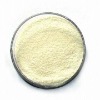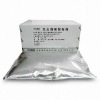Docosahexaenoic acid (DHA)Fish Oil 1)Fish Oil Source 2)CAS NO: 3)All The Content Is Available 4)Wide Application Overview:
Docosahexaenoic acid (DHA) is an omega-3 fatty acid. It is found in cold water fatty fish and fish oil supplements, along with eicosapentaenoic acid (EPA). Vegetarian sources of DHA come from seaweed. DHA is essential for the proper functioning of our brains as adults, and for the development of our nervous system and visual abilities during the first 6 months of life. In addition, omega-3 fatty acids are part of a healthy diet that helps lower risk of heart disease. Our bodies naturally produce small amounts of DHA, but we must get the amounts we need from our diet or supplements. Most people in the Western world do not get enough omega-3 fatty acids in their diet.
Uses:Attention-Deficit Hyperactivity Disorder (ADHD)
Because omega-3 fatty acids are needed for children's brains to develop properly, researchers have examined whether fish oil might reduce ADHD symptoms. So far, results have been mixed. One study showed fish oil might help, but many patients dropped out of the study before it was completed.
Depression
Although some studies have shown that fish oil reduces symptoms of depression, it isn't clear whether DHA alone has the same effect. Other studies suggest it may be EPA which has the positive effect on depression.
Heart Disease
Fish oil appears to have positive effects on existing heart disease. It also may lower the risk for developing heart disease. Omega-3 fatty acids found in fish oil help lower triglycerides (fats in the blood), lower blood pressure, reduce the risk of blood clots, improve the health of arteries, and reduce the amount of arterial plaque (which narrows arteries and causes heart disease).
Infant Development
DHA plays a crucial role in the growth and development of the central nervous system as well as visual functioning in infants.
Rheumatoid Arthritis
Several small studies indicate that fish oil may help reduce symptoms and inflammation associated with rheumatoid arthritis. However, it does not stop the progression of the disease.
Menstrual Pain
Fish oil appears to reduce the pain of menstrual cramps when taken on a regular basis (not just when menstruating).
Raynaud Syndrome
Several studies show that high doses (12 g) of fish oil can reduce sensitivity to cold in the fingers and toes of people with Raynaud syndrome. Take doses this high only under a doctor's supervision.
Lupus
Two small studies suggested that fish oil reduced fatigue and joint pain associated with lupus.
Dietary Sources:DHA is found in cold water fatty fish, including salmon, tuna (bluefin tuna have up to five times more DHA than other types of tuna), mackerel, sardines, shellfish, and herring. Although some of these fish contain low levels of mercury, the Food and Drug Administration has found that consuming several servings of fish each week poses no risk to healthy people and conveys many health benefits. Women who are pregnant or planning to become pregnant should avoid Atlantic mackerel, shark, swordfish, and tilefish. They should also limit consumption of white albacore tuna to under 6 oz. per week. (High-quality fish oil supplements made by manufacturers who test for mercury and other toxins do not pose the same risk of mercury contamination. Read labels carefully and check for purity, or ask your doctor to help you find the best quality DHA supplement.) For infants, breast milk from a well-nourished mother contains significant amounts of DHA, while infant formula may not have any DHA. Read labels carefully to find a brand that does.
Available Forms:DHA is available as a supplement in two common forms:
Fish oil capsules [which contain both DHA and EPA (eicosapentaenoic acid), another omega-3 fatty acid] DHA extracted from algae (which contains no EPA)How to Take It:Pediatric
Breast-fed infants should receive enough DHA if the mother gets enough of this fatty acid.Adult
Most studies have used 1,000 - 2,500 mg of DHA per day. In the diet: 2 - 3 servings of fatty fish per week, which corresponds to 1,250 mg EPA and DHA per day. Fish oil supplements: 3,000 - 4,000 mg standardized fish oils per day. Read the label to check levels of DHA and EPA, which are not the same as mg of fish oil. Higher doses are generally considered safe, but people who take blood-thinning medication or people who have hemophilia should check with their doctors to determine a safe dose. Pregnant women: 200 mg DHA per day Algal-derived DHA supplements: 200 mg per daySome fish oil supplements also contain vitamin E to maintain freshness.
Precautions:Fish oil capsules contain both DHA and EPA. Supplements containing EPA may not be recommended for infants or small children because they upset the balance between DHA and EPA during early development. Pregnant women should talk to their doctor before taking fish oil supplements.
Fish oil capsules may cause minor side effects, such as loose stools, abdominal discomfort, and belching. In addition, they may prolong bleeding time slightly. If you take blood-thinning medication, talk to your doctor before taking fish oil.
Possible Interactions:Blood Pressure Medication -- DHA may lower blood pressure, so it could make the effects of prescription blood pressure medication stronger.
Anticoagulants (blood thinners) -- EPA in fish oil supplements may increase bleeding time, so fish oil could make the effects of these drugs stronger. The same does not appear to be true of DHA alone.
Diabetes medications -- Theoretically, fish oil supplements may lower levels of glucose in the blood and could make effects of diabetes drugs stronger. If you have diabetes, talk to your doctor before taking fish oil.
Aspirin -- In combination with aspirin, fish oil could be helpful in the treatment of some forms of coronary artery disease. However, this combination may also increase the risk of bleeding. Talk to your doctor to see if this combination is right for you.
Cyclosporine -- Omega-3 fatty acids may reduce some of the side effects associated with cyclosporine therapy, which is often used to reduce rejection in transplant recipients. Talk to your doctor before adding any new herbs or supplements to your existing medication regimen.
FISH OIL






